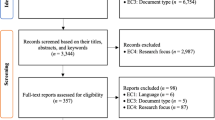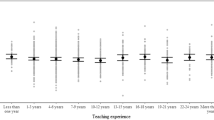Abstract
This paper discusses different conceptual frameworks for measuring mathematics pedagogical content knowledge (MPCK) in international comparison studies. Two large-scale international comparative studies, Mathematics Teaching in the Twenty-First Century (MT21; Schmidt et al., 2011) and the Teacher Education and Development Study in Mathematics (TEDS-M; Tatto et al., 2012), were used for analysis. The challenges faced by these studies included the lack of elaborate conceptual frameworks for MPCK developed by non-Western scholars and the corresponding test items that were tied to the frameworks. In this paper, I introduce a conceptual framework developed by Hsieh (Secondary Education, 63(3), 30–47, (2012) in Taiwan relating to MPCK. The items of the 2 international comparison studies were reexamined according to Hsieh’s model. A study based on Hsieh’s model is introduced to manifest the existence of distinct or probably conflicting ideas between Taiwanese and Western countries regarding the scope and substance of different types of mathematics teachers’ knowledge. Hsieh’s model is a start toward searching for an East Asian identity in MPCK.
Similar content being viewed by others
References
An, S., Kulm, G. & Wu, Z. (2004). The pedagogical content knowledge of middle school mathematics teachers in China and the U.S. Journal of Mathematics Teacher Education, 7, 145–172.
Arkar, H., Sorias, O., Tunca, Z., Şafak, C., Alkin, T., Binnur Akdede, B. & Cimilli, C. (2005). Factorial structure, validity and reliability of the Turkish temperament and character inventory. Turkish Journal of Psychiatry, 16(3), 1–14.
Ball, D. L. & Bass, H. (2003). Toward a practice-based theory of mathematical knowledge for teaching. In B. Davis & E. Simmt (Eds.), Proceedings of the 2002 Annual Meeting of the Canadian Mathematics Education Study Group (pp. 3–14). Edmonton, Alberta, Canada: Canadian Mathematics Education Study Group/Groupe Canadien d’e´tude En Didactique des Mathe´matiques.
Ball, D. L., Hill, H. C. & Bass, H. (2005). Knowing mathematics for teaching: Who knows mathematics well enough to teach third grade, and how can we decide? American Educator, 29, 14–22.
Ball, D. L., Thames, M. H. & Phelps, G. (2008). Content knowledge for teaching. What makes it special? Journal of Teacher Education, 59(5), 389–407.
Baumert, J., Kunter, M., Blum, W., Brunner, M., Voss, T., Jordan, A., Klusmann, U., Krauss, S., Neubrand, M. & Tsai, Y.-M. (2010). Teachers’ mathematical knowledge, cognitive activation in the classroom, and student progress. American Educational Research Journal, 47(1), 133–180.
Bond, T. G. & Fox, C. M. (2007). Applying the Rasch model: Fundamental measurement in the human sciences. Mahwah, NJ: Lawrence Erlbaum.
Cohen, J. (1992). A power primer. Psychological Bulletin, 112(1), 155–159.
Delaney, S., Ball, D. L., Hill, H. C., Schilling, S. G. & Zopf, D. (2008). “Mathematical knowledge for teaching”: Adapting U.S. measures for use in Ireland. Journal of Mathematics Teacher Education, 11(3), 171–197.
ETS (2010). Elementary education: Content knowledge (0014/5014). Princeton, NJ: Educational Testing Service. Retrieved 29 July 2011 from http://www.ets.org/Media/Tests/PRAXIS/taag/0014/glance.htm.
Ernest, P. (1989). The knowledge, beliefs and attitudes of the mathematics teacher: A model. Journal of Education for Teaching: International Research and Pedagogy, 15(1), 13–33.
Grossman, P. L. & McDonald, M. (2008). Back to the future: Directions for research in teaching and teacher education. American Educational Research Journal, 45(1), 184–205.
Hill, H. C., Ball, D. L. & Schilling, S. G. (2008). Unpacking pedagogical content knowledge: Conceptualizing and measuring teachers’ topic-specific knowledge of students. Journal for Research in Mathematics Education, 39(4), 372–400.
Hill, H. C., Schilling, S. G. & Ball, D. L. (2004). Developing measures of teachers’ mathematics knowledge for teaching. The Elementary School Journal, 105(1), 11–30.
Hsieh, F.-J. (2006). Research on the development of the professional ability for teaching mathematics in the secondary school level (1/3) (Rep. No. NSC 94-2522-S-003-009). Taiwan: National Science Council (in Chinese).
Hsieh, F.-J. (2009). Research on the development of the professional ability for teaching mathematics in the secondary school level (3/3) (Rep. No. NSC 96-2522-S-003-008). Taiwan: National Science Council (in Chinese).
Hsieh, C.-J. (2011).
 [Concept images of mathematics teaching of secondary mathematics pre-service teachers]. Unpublished doctoral dissertation, National Taiwan Normal University, Taipei.
[Concept images of mathematics teaching of secondary mathematics pre-service teachers]. Unpublished doctoral dissertation, National Taiwan Normal University, Taipei.Hsieh, F.-J. (2012). 國高中數學教學專業知能指標 [Indicators of professional mathematics teaching competence at the secondary school level]. Secondary Education, 63(3), 30–47.
Hsieh, F.-J., Lin, P.-J. & Wang, T.-Y. (2012). Mathematics related teaching competence of Taiwanese primary future teachers: Evidence from the TEDS-M. ZDM—The International Journal on Mathematics Education, 44(3), 277–292. doi:10.1007/s11858-011-0377-7.
Huang, R., & Leung, F. K. S. (2002). Is there a Chinese approach? A comparison on the ways of teaching the Pythagoras theorem among Australia, Czech Republic, Hong Kong and Shanghai. Proceedings of 2nd EARCOME, Singapore, vol. 2, pp. 247–252.
König, J., Blömeke, J., Paine, L., Schmidt, W. H. & Hsieh, F.-J. (2011). General pedagogical knowledge of future middle school teachers: On the complex ecology of teacher education in United States, Germany, and Taiwan. Journal of Teacher Education, 62(2), 188–201. doi:10.1177/0022487110388664.
Krauss, S., Baumert, J. & Blum, W. (2008). Secondary mathematics teachers’ pedagogical content knowledge and content knowledge: Validation of the COACTIV constructs. The International Journal on Mathematics Education, 40(5), 873–892.
Lee, Y.-S., Lin, F.-L., Leu, Y.-C. & Chen, M.-F. (2008). 小學教師數學教學發展標準之探究:學者的觀點 [The standards for development in elementary mathematics teaching: Perspectives of elementary mathematics educators]. Chinese Journal of Science Education, 16(6), 627–650.
Leung, F. K. S. (2001). In search of an East Asian identity in mathematics education. Educational Studies in Mathematics, 47, 35–51.
Li, C.-L. & Chung, J. (2007). 數學種子教師專業知能內涵之探討 [Professional knowledge and abilities of a mathematics teacher leader]. Journal of Taiwan Normal University: Mathematics & Science Education, 52, 23–47.
Linacre, J. M. (2009). WINSTEPS Rasch measurement computer program (version 3.69.0), Beaverton, Oregon. Winsteps.com.
Ma, L. (1999). Knowing and teaching elementary mathematics: Teachers’ understanding of fundamental mathematics in China and the United States. Mahwah, NJ: Lawrence Erlbaum.
Masters, G. N. (1982). A Rasch model for partial credit scoring. Psychometrika, 47(2), 149–174.
Mickovska, A. (2009). A comparative analysis of Macedonian and English teachers’ implicit theories of pupils’ intelligence and motivation. Journal of European Psychology Students, 1(1), 1–10.
Ministry of Education (1999). 九年一貫課程概要內涵 [Essentials of nine year sequential curriculum]. Retrieved 5 July 2002 from http://teach.eje.edu.tw/9CC/brief/brief8.php.
National Board for Professional Teaching Standards (2001). NBPTS early childhood generalist standards (2nd ed.). Arlington, VA: National Board for Professional Teaching Standards.
National Council of Teachers of Mathematics (2000). Principles and standards for school mathematics. Reston, VA: National Council of Teachers of Mathematics.
Park, K. (2005). Mathematics teacher education in East Asian countries—From the perspective of pedagogical content knowledge. Proceedings of the Third International ICMI East Asia Regional Conference on Mathematics Education, 7–12 August 2005, Shanghai.
Pepin, B. (1999). Existing models of knowledge in teaching: Developing an understanding of the Anglo/American, the French and the German scene. TNTEE Publications, 2(1), 49–66.
Putnam, R. T. & Borko, H. (2000). What do new views of knowledge and thinking have to say about research on teacher learning. Educational Researcher, 29, 4–15.
Schmidt, W. H., Blömeke, S., Tatto, M. T., Hsieh, F.-J., Cogan, L., Houang, R. T., et al (2011). Teacher education matters: A study of middle school mathematics teacher preparation in six countries. New York, NY: Teacher College Press.
Schön, D. A. (1983). The reflective practitioner: How professionals think in action. New York, NY: Basic Books.
Shulman, L. S. (1986). Those who understand: Knowledge growth in teaching. Educational Researcher, 15(2), 4–14.
Shulman, L. S. (1987). Knowledge and teaching: Foundations of the new reform. Harvard Educational Review, 57(1), 1–22.
Tatto, M. T., Schwille, J., Senk, S., Ingvarson, L., Peck, R. & Rowley, G. (2008). Teacher Education and Development Study in Mathematics (TEDS-M): Policy, practice, and readiness to teach primary and secondary mathematics. Conceptual framework. East Lansing, MI: Teacher Education and Development International Study Center, College of Education, Michigan State University.
Tatto, M. T., Schwille, J., Senk, S., Ingvarson, L., Rowley, G., Peck, R., et al (2012). Policy, practice, and readiness to teach primary and secondary mathematics in 17 countries. Amsterdam: Multicopy.
Viadero, D. (2004). Teaching mathematics requires special set of skills. Education Week, p. 8.
Wang, T.-Y., Hsieh, F.-J., & Schmidt, W. H. (2012). Comparison of mathematical language-related teaching competence of future teachers from Taiwan and the United States. Proceedings of the Annual Meeting of the International Group for the Psychology of Mathematics Education, Taiwan, vol. 4, pp. 211–218.
Author information
Authors and Affiliations
Corresponding author
Rights and permissions
About this article
Cite this article
Hsieh, FJ. STRENGTHENING THE CONCEPTUALIZATION OF MATHEMATICS PEDAGOGICAL CONTENT KNOWLEDGE FOR INTERNATIONAL STUDIES: A TAIWANESE PERSPECTIVE. Int J of Sci and Math Educ 11, 923–947 (2013). https://doi.org/10.1007/s10763-013-9425-9
Received:
Accepted:
Published:
Issue Date:
DOI: https://doi.org/10.1007/s10763-013-9425-9





 [Concept images of mathematics teaching of secondary mathematics pre-service teachers]. Unpublished doctoral dissertation, National Taiwan Normal University, Taipei.
[Concept images of mathematics teaching of secondary mathematics pre-service teachers]. Unpublished doctoral dissertation, National Taiwan Normal University, Taipei.